Ealdwulf is a male given name used by:
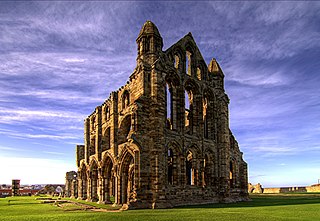
Year 664 (DCLXIV) was a leap year starting on Monday of the Julian calendar. The denomination 664 for this year has been used since the early medieval period, when the Anno Domini calendar era became the prevalent method in Europe for naming years.

Offa was King of Mercia, a kingdom of Anglo-Saxon England, from 757 until his death. The son of Thingfrith and a descendant of Eowa, Offa came to the throne after a period of civil war following the assassination of Æthelbald. Offa defeated the other claimant, Beornred. In the early years of Offa's reign, it is likely that he consolidated his control of Midland peoples such as the Hwicce and the Magonsæte. Taking advantage of instability in the kingdom of Kent to establish himself as overlord, Offa also controlled Sussex by 771, though his authority did not remain unchallenged in either territory. In the 780s he extended Mercian Supremacy over most of southern England, allying with Beorhtric of Wessex, who married Offa's daughter Eadburh, and regained complete control of the southeast. He also became the overlord of East Anglia and had King Æthelberht II of East Anglia beheaded in 794, perhaps for rebelling against him.

Æthelred was king of Mercia from 675 until 704. He was the son of Penda of Mercia and came to the throne in 675, when his brother, Wulfhere of Mercia, died from an illness. Within a year of his accession he invaded Kent, where his armies destroyed the city of Rochester. In 679 he defeated his brother-in-law, Ecgfrith of Northumbria, at the Battle of the Trent: the battle was a major setback for the Northumbrians, and effectively ended their military involvement in English affairs south of the Humber. It also permanently returned the kingdom of Lindsey to Mercia's possession. However, Æthelred was unable to re-establish his predecessors' domination of southern Britain.
Æthelberht, Aethelbert or Ethelbert is a masculine given name which may refer to:

Lichfield Cathedral is an Anglican cathedral in Lichfield, Staffordshire, England, one of only three cathedrals in the United Kingdom with three spires, and the only medieval one of the three. It is the cathedral of the Diocese of Lichfield, which covers Staffordshire, much of Shropshire, and parts of the Black Country and West Midlands. It is the seat of the Bishop of Lichfield, currently Michael Ipgrave, who was appointed in 2016. It is a Grade I listed building.
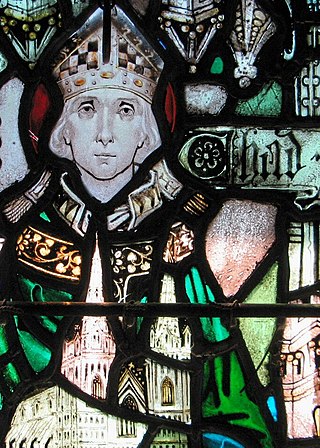
Chad was a prominent 7th-century Anglo-Saxon Catholic monk who became abbot of several monasteries, Bishop of the Northumbrians and subsequently Bishop of the Mercians and Lindsey People. He was later canonised as a saint.
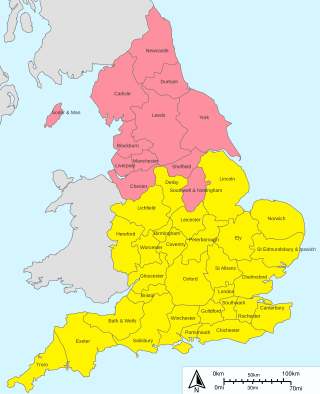
This article traces the historical development of the dioceses and cathedrals of the Church of England. It is customary in England to name each diocese after the city where its cathedral is located. Occasionally, when the bishop's seat has been moved from one city to another, the diocese may retain both names, for example Bath and Wells. More recently, where a cathedral is in a small or little-known city, the diocesan name has been changed to include the name of a nearby larger city: thus the cathedral in Southwell now serves the diocese of Southwell and Nottingham, and Ripon Cathedral was in Ripon and Leeds from 1999 until 2014. Cathedrals, like other churches, are dedicated to a particular saint or holy object, or Christ himself, but are commonly referred to by the name of the city where they stand. A cathedral is, simply, the church where the bishop has his chair or "cathedra".
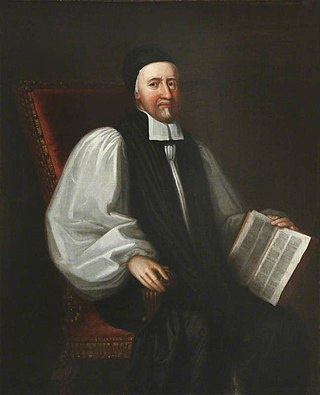
Accepted Frewen was a priest in the Church of England and Archbishop of York from 1660 to 1664.
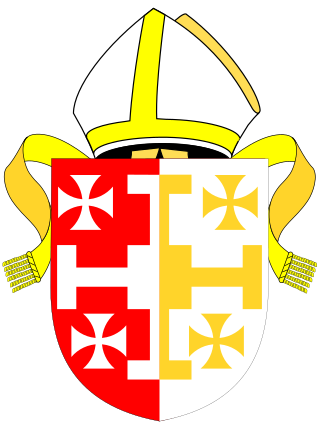
The Diocese of Lichfield is a Church of England diocese in the Province of Canterbury, England. The bishop's seat is located in the Cathedral Church of the Blessed Virgin Mary and Saint Chad in the city of Lichfield. The diocese covers 4,516 km2 (1,744 sq mi) of several counties: almost all of Staffordshire, northern Shropshire, a significant portion of the West Midlands, and very small portions of Warwickshire and Powys (Wales).
Jænberht was a medieval monk, and later the abbot, of St Augustine's Abbey, Canterbury, who was named Archbishop of Canterbury in 765. As archbishop, he had a difficult relationship with King Offa of Mercia, who at one point confiscated lands from the archbishopric. By 787, some of the bishoprics under Canterbury's supervision were transferred to the control of the newly created Archbishopric of Lichfield, although it is not clear if Jænberht ever recognised its legitimacy. Besides the issue with Lichfield, Jænberht also presided over church councils in England. He died in 792 and was considered a saint after his death.
The Bishop of Lichfield is the ordinary of the Church of England Diocese of Lichfield in the Province of Canterbury. The diocese covers 4,516 km2 of the counties of Powys, Staffordshire, Shropshire, Warwickshire and West Midlands. The bishop's seat is located in the Cathedral Church of the Blessed Virgin Mary and Saint Chad in the city of Lichfield. The Bishop's residence is the Bishop's House, Lichfield, in the cathedral close. In the past, the title has had various forms. The current bishop is Michael Ipgrave, following the confirmation of his election on 10 June 2016.
Ealdwulf was a medieval Abbot of Peterborough, Bishop of Worcester, and Archbishop of York.

Æthelhard was a Bishop of Winchester then an Archbishop of Canterbury in medieval England. Appointed by King Offa of Mercia, Æthelhard had difficulties with both the Kentish monarchs and with a rival archiepiscopate in southern England, and was deposed around 796 by King Eadberht III Præn of Kent. By 803, Æthelhard, along with the Mercian King Coenwulf, had secured the demotion of the rival archbishopric, once more making Canterbury the only archbishopric south of the Humber in Britain. Æthelhard died in 805, and was considered a saint until his cult was suppressed after the Norman Conquest in 1066.
Hygeberht was the bishop of Lichfield from 779 and archbishop of Lichfield after the elevation of Lichfield to an archdiocese some time after 787, during the reign of the powerful Mercian king Offa. Little is known of Hygeberht's background, although he was probably a native of Mercia.
Ealdwulf, also known as Aldulf or Adulf, was king of East Anglia from c. 664 to 713. He was the son of Hereswitha, a Northumbrian princess, and of Æthilric, whose brothers all ruled East Anglia during the 7th century. Ealdwulf recalled that when he was very young, he saw the Christian/pagan temple belonging to his ancestor Rædwald.
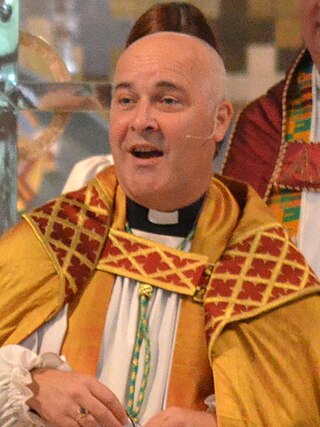
The Archbishop of York is a senior bishop in the Church of England, second only to the Archbishop of Canterbury. The archbishop is the diocesan bishop of the Diocese of York and the metropolitan bishop of the province of York, which covers the northern regions of England as well as the Isle of Man.
Eardwulf or Eardulf is an Anglo-Saxon male name. Notable people with the name include:
Seaxwulf was the founding abbot of the Mercian monastery of Medeshamstede, and an early medieval bishop of Mercia. Very little is known of him beyond these details, drawn from sources such as Bede's Ecclesiastical History. Some further information was written down in the 12th century at Peterborough Abbey, as Medeshamstede was known by that time. This suggests that he began his career as a nobleman, and that he may have had royal connections outside Mercia.
Eadwulf is an Anglo-Saxon male name. Notable people with the name include:
The Christianisation of Anglo-Saxon England was a process spanning the 7th century. It was essentially the result of the Gregorian mission of 597, which was joined by the efforts of the Hiberno-Scottish mission from the 630s. From the 8th century, the Anglo-Saxon mission was, in turn, instrumental in the conversion of the population of the Frankish Empire.